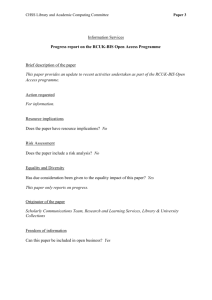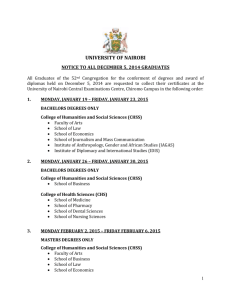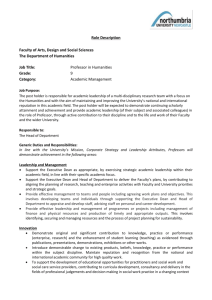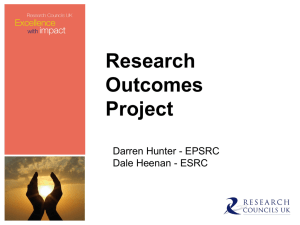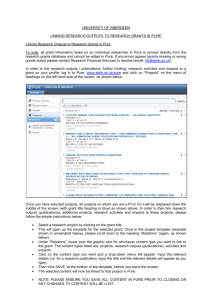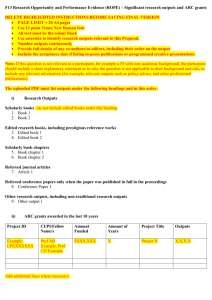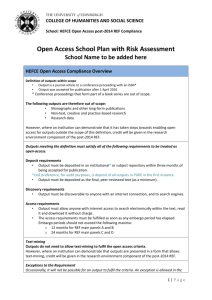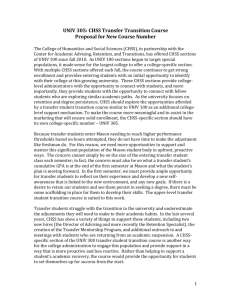Example Open Access Facilitator Job Description
advertisement
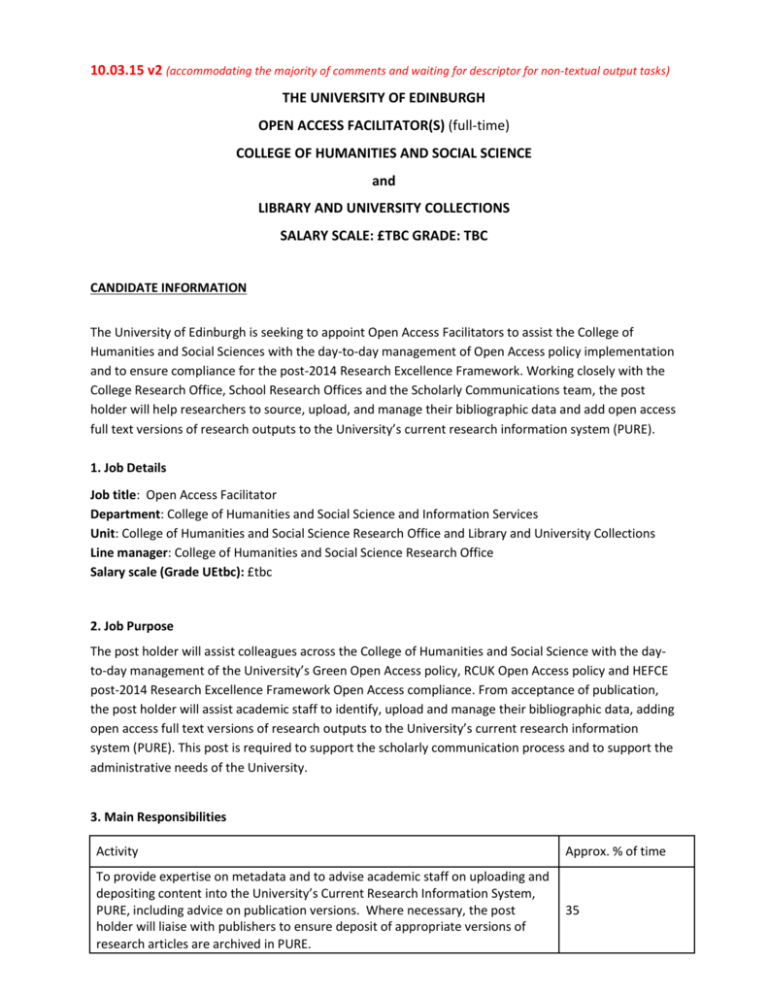
10.03.15 v2 (accommodating the majority of comments and waiting for descriptor for non-textual output tasks) THE UNIVERSITY OF EDINBURGH OPEN ACCESS FACILITATOR(S) (full-time) COLLEGE OF HUMANITIES AND SOCIAL SCIENCE and LIBRARY AND UNIVERSITY COLLECTIONS SALARY SCALE: £TBC GRADE: TBC CANDIDATE INFORMATION The University of Edinburgh is seeking to appoint Open Access Facilitators to assist the College of Humanities and Social Sciences with the day-to-day management of Open Access policy implementation and to ensure compliance for the post-2014 Research Excellence Framework. Working closely with the College Research Office, School Research Offices and the Scholarly Communications team, the post holder will help researchers to source, upload, and manage their bibliographic data and add open access full text versions of research outputs to the University’s current research information system (PURE). 1. Job Details Job title: Open Access Facilitator Department: College of Humanities and Social Science and Information Services Unit: College of Humanities and Social Science Research Office and Library and University Collections Line manager: College of Humanities and Social Science Research Office Salary scale (Grade UEtbc): £tbc 2. Job Purpose The post holder will assist colleagues across the College of Humanities and Social Science with the dayto-day management of the University’s Green Open Access policy, RCUK Open Access policy and HEFCE post-2014 Research Excellence Framework Open Access compliance. From acceptance of publication, the post holder will assist academic staff to identify, upload and manage their bibliographic data, adding open access full text versions of research outputs to the University’s current research information system (PURE). This post is required to support the scholarly communication process and to support the administrative needs of the University. 3. Main Responsibilities Activity Approx. % of time To provide expertise on metadata and to advise academic staff on uploading and depositing content into the University’s Current Research Information System, PURE, including advice on publication versions. Where necessary, the post holder will liaise with publishers to ensure deposit of appropriate versions of research articles are archived in PURE. 35 Ensure metadata relating to full text versions of research outputs are correctly collected and entered into the PURE. This also includes the recording of essential information applicable to the output and linking of outputs to sources of funding and other activities recorded in PURE. Responsible for checking, auditing and reporting on outputs for HEFCE post-2014 REF compliance and all other external and internal reporting requirements. For example, RCUK OA compliance, annual RCUK Outcomes collection and School Research Committees. Provide advice for non-textual outputs and copyright as required. To contribute to and participate in open access awareness events and programmes and to train and assist academic and research administrative staff in Open Access policy and practice. Ensure all staff are regularly updated with latest policies and requirements. Ensure all academic and research administration open access guidance is up to date. Create and maintain open access communication via webpages and social media. As required, update local tracking spreadsheets relating to publishers’ policies not accessible through SHERPA/ROMEO and regularly update journal lists for Schools. 30 10 10 10 5 4. Planning and Organising The post holder will provide advisory and administrative support to a number of Schools within the College. The CHSS Research Officer and the Scholarly Communications Manager will set priorities and allocate work to meet service and project targets. The post holder organises their own time on a weekly basis, balancing allocated work with immediate demands as they arise to ensure targets are met. 5. Problem Solving Judgement and interpretation are required when making decisions and assisting authors with publication options. For example, when entering and reviewing entries in bibliographic databases the post holder will need to decide on the best use of available resources for interpretation of information. More complex problems can be referred to the Scholarly Communications Manager, the College Research Officer and senior academic staff where necessary. 6. Decision Making The post-holder will routinely make the following types of decisions: ● ● ● Decisions about organising own time within context of service targets and work set by team manager. Make decisions as to the ‘best fit’ of publication options based on available data such as copyright policy and publisher. Making decisions about the most suitable form of communication for different situations, and the key messages that must be communicated and those that would be better left for a different opportunity. 7. Key Contacts/Relationships 2 ● ● ● ● ● ● Academic colleagues within CHSS CHSS Research Officer University Scholarly Communications Manager Research Administrators within CHSS Schools Senior colleagues within the CHSS College Office Other members of staff in the Scholarly Communications Team. Such working relationships may be on a formal or informal basis, face to face, through written communication or by phone. 8. Knowledge, Skills and Experience Needed for the Job Essential Demonstrable knowledge of open access and the academic publishing process and workflows. Excellent IT skills, with proven competence of using Excel, including the ability to manipulate and transform data to a high level of accuracy. • Experience of preparing reports, also writing and production of material for a range of audiences. • Experience of working as part of a multi-disciplinary team and supporting team members and academics with a capacity to complete projects independently and collaboratively. • A good communicator with a desire to work with the University to deliver a well-regarded, accountable, effective, and efficient Open Access publications processing service. • Excellent organisational and time-management skills with a keen attention to detail and accuracy. Desirable Knowledge of commercial bibliographic databases and subject research repositories, such as Web of Science, arXiv or PubMed. Experience of preparing and presenting projects to a variety of audiences. Appreciation of software systems used by Universities and researchers to maintain their record of published research outputs (for example tools such as DSpace, Reference Manager, PURE, Endnote or Mendeley). Experience of copyediting. Experience of InDesign, Powerpoint and manipulating images. An interest in creative practice. Demonstrable previous experience of writing for both print and internet outlets. Attributes • Calm demeanour, resourcefulness, reliability, commitment, flexibility. • A willingness to take responsibility and to propose and deliver solutions. • Tact, persuasiveness and assertiveness. • Accurate, thorough and methodical approach to work • Ability to use own initiative and take appropriate decisions. 3 9. Dimensions The Open Access Facilitator will be part of the CHSS Research Office and also work more directly with colleagues across the Colleges 11 Schools and the Scholarly Communications Team, which undertakes activities for the whole University. When working within the Scholarly Communications Team, the post holder will work closely with others, share experience and work across the team. The team will have access to well-informed senior staff in order to facilitate the activity of sourcing, checking and uploading into our systems of the full-text research outputs of the College. The Open Access Facilitator is expected to spend around 10% of their time in the Main Library and 90% of their time within allocated CHSS Schools. 10. Job Context and any other relevant information Following on from the publication of the Finch report in 2012, the Research Councils UK (RCUK) published their response. This requires the University to deliver high levels of Open Access research outputs. Many more papers will need to be archived in the institutional repository systems. This role will be part of a programme of work across the university to deliver these requirements and to ensure and provide evidence that the university is compliant in this area. It will also assist academics to be compliant with the HEFCE Post-2014 REF Open Access policy. 4
